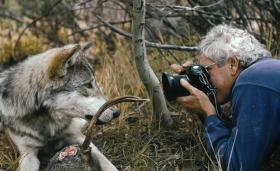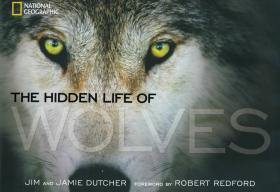The Dutchers recently talked with Samantha Wright about their experience. Jim Dutcher says wolves are misunderstood and that made them an interesting animal to film:
“I was searching for an animal that I could reveal its secret life and the wolf was perfect,” says Jim Dutcher. “I had done films on beavers and cougars and undersea subjects, but the wolf was so much more. It’s a pack animal. It’s intelligent. It goes on and on.”
Q. Both of you lived in a tent, a yurt, and you were part of the pack. How long were you out there?
A. Jim Dutcher: We were there for six years. If you went out into the wild and try to film wolves, they’re so wary of people, they’re so cautious, that they change their natural behavior when they feel they’re being observed. We wanted to film and study their social behavior, so we raised these wolves from pups, bottle feeding from the moment they opened their eyes. We got to get into a pack of wolves, into their lives, and study their social behavior.
Q. What was that like? What did you learn that you didn’t know before?
A. Jamie Dutcher: We really learned how family-oriented they are, how bonded they are to each other, how compassionate and caring they are. We, as humans, already understand that elephants, great apes, whales, dolphins experience the same kind of family social bond and it’s about time that we recognize that in our north American gray wolf.
We’re really lucky to have an animal like that. It’s not only a keystone species, animals in the environment depend on it, but it also lives its life not very different than ours. It’s very easy to watch wolves and not only see your family pet, the dog, which is directly descended from wolves, but also to see your office co-workers at times, squabbling.
Q. You formed some pretty strong bonds with some of these wolves. Which one stands out for you?
A. Jamie Dutcher: I think for me, Lakota was really special. He was the Omega wolf, he was at the bottom of the pack, he was always picked on. He was the ultimate underdog. He was also, interestingly, the instigator of play, to kind of reduce the tension. It was really nice observing him and being around him and kind of cheering him on at times.
Q. In the end, what happened to the pack?
A. Jamie Dutcher: It was conducted on Forest Service land and our permits had expired, but we knew were going to have to find a permanent home for the wolves. The Nez Perce tribe in northern Idaho was brought into the picture and the wolves were moved up there in a similar situation where they could live out their lives.
Q. All this footage that you had with the wolves, you turned that into a series of films?
A. Jim Dutcher: We produced three films on the Sawtooth Pack. The last one came out in 2005. We received three Emmys for those films. Jamie actually got an Emmy for the soundtracks, recordings of the wolf howls and vocalizations.
Q. What has the response that you got when the films came out and people learned something new about wolves?
A. Jamie Dutcher: The response when the films came out, and our books, has been really quite tremendous. I think one of the most important things is we’ve been approached by hunters who have said I always wanted to kill a wolf, but I can’t now, I didn’t realize they were such family animals, that they had a bond that they cared about each other.
So that’s been very important to us. People who didn’t know, that are now learning, that wolves really are these caring, social beings. That’s the most important thing to us, what we walk away with from people learning about our films, that we really do need wolves. We need them on the landscape and there are ways to live with wolves. This new book of ours, “The Hidden Life of Wolves,” we touch on that, on ranching solutions, ways we can get along with wolves, amongst other things.
Q. What’s your prediction for the future of wolves?
A. Jim Dutcher: The future lies with children. We go to schools often and speak and give our presentation and I think that’s where the future is, the younger generations, they understand all this.
Jamie Dutcher: Yes, if it were up to the adults, I don’t think wolves would have much of a chance.
Jim and Jamie Dutcher now live in Ketchum. Their new National Geographic book “The Hidden Life of Wolves,” was released this week.
Royalities from the book will go to the Dutcher’s non-profit group Living With Wolves.
source




No comments:
Post a Comment